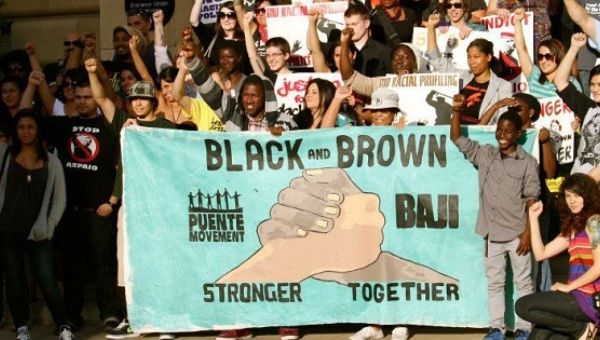- About
- Topics
- Story
- In-Depth
- Picks
- Opinion
- News
- Donate
- Signup for our newsletterOur Editors' Best Picks.Send
Read, Debate: Engage.
| March 27, 2017 | |
|---|---|
| topic: | Refugees and Asylum |
| tags: | #Kilap Gueye, #Noise, #Sardegna Teatro, #Sardinia |
| located: | Italy |
| by: | Federica Tedeschi |
The pivotal project, launched in April 2016 in Cagliari (Sardinia, Italy), was set up by theatre company Sardegna Teatro and local online TV channel Eja TV, after having won the MigrArti competition with the Ministry of Cultural Heritage and Activities and Tourism.
Senegalese Kilap Gueye is one of eight reporters Nois avails itself of; also a teacher and a writer who has been living in Sardinia since 2000, he said:
“Things have changed dramatically over the last 16 years: back then there were not so many immigrants in this island”.
Nois is done in the television studio of Massimo theatre in Cagliari and the focus of the four multilingual episodes produced so far is on the everyday life of immigrants integrating into the Italian society through language courses, work and social events. The programme also highlights the culture and customs of different groups, as well as their cinematographic & literary tradition and provides newcomers with all the relevant information they could possibly need.
“Italian media have a tendency of delivering a negative image of us and people do not generally verify those news contents which cause fear and prejudice. This kind of attitude about migrants, in general, can only create barriers”.
The other mission of Nois is to show all the difficulties these adoptive citizens face once arrived in Sardinia and which immigrants all over Europe are likely to be confronted with, as well.
The kind of information they rely on at the beginning of their experience does not contain warnings, neither gives advice to identify potential adverse situations waiting for them in the new country. Many immigrants arriving in Sardinia are even unaware that their destination is an island; Cagliari, the region’s capital on the south coast is closer to Africa than mainland Italy and its strategic position explains the flow of newcomers from the world’s second-largest continent.
“Nois gives the public a first-hand account of the everyday life of an immigrant and the people who can best explain this difficult situation are those who left their country to start a new life overseas. We can put ourselves in their shoes and sincerely empathise with them. This programme helps people to understand the reality”, said Abdellarif Yakoubou, a Nois reporter from Benin. The young man, who arrived in Sardinia in 2015 after having shortly lived in several other countries, had always dreamt of being a journalist and was informed about the project by one of his school teachers in Cagliari.
“Here it is not a paradise! The immigrants who are settled in Sardinia and go back home on holidays rarely say the truth about the hurdles of their initial journey and their life of challenges and sacrifice in Italy.
It is important to show the reality and curb the misconception of those who believe this country is paved with gold. In this way those who decide to start their voyage towards Europe are aware of what awaits them”, emphasised Kilap Gueye.
Nois newsroom benefits from a Facebook page and a blog for the different communities to interact by leaving comments, information or telling unveiled stories through videos, articles and pictures which are often published. Material from any external contributors is in fact gladly received and analyzed by the news team which includes reporters from Lebanon, Russia, Ukraine, China and India and is coordinated by two Italian journalists, all of them paid for their job.
The editorial team, who is currently producing videos on cultural events, is actively looking for funding to keep the project alive.
“Nois is a cultural revolution: there is so much to learn about the immigrants’ lives here and it is enriching to explore the challenges they face. The programme can teach a lot to the future generations as well.
It is an incredible project which aims to build bridges between cultures and deserves support”, added Mr Gueye.
Nois is one of a growing number of migrant-led projects across Europe, including Cork’s multicultural newspaper “The Immigrant’ and Congo Lisanga in Ireland, as well as Slaney Street media project in the UK, just to mention a few.
By copying the embed code below, you agree to adhere to our republishing guidelines.
